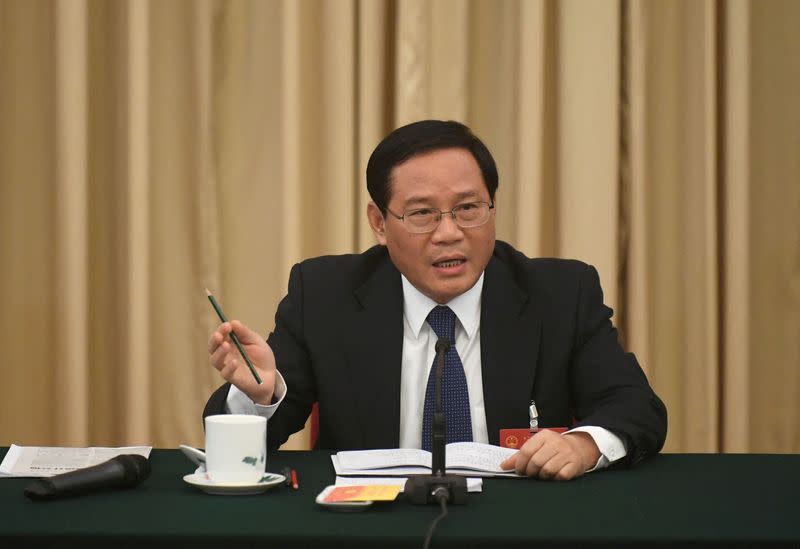Leaders of South Korea and China agreed on Sunday to resume talks on a free-trade deal, plus dialogue on diplomacy and security.
South Korean President Yoon Suk Yeol and Chinese Premier Li Qiang spoke on Sunday, Yoon’s office said, a day before a summit with their Japanese counterpart Fumio Kishida. The three-way talks will be the first in more than four years.
Yoon told Li the two countries should work together not only to promote shared interests based on mutual respect, but also on regional and global issues to tackle common challenges, citing the Ukraine war, the Israel-Hamas conflict and global economic uncertainties.
ALSO SEE: Musk Wants a ‘GigaComputer’ For xAI ChatBot: The Information
“Just as Korea and China have overcome various difficulties together over the past 30 years and contributed to each other’s development and growth, I hope to continue to strengthen bilateral cooperation even in the face of today’s global complex crises,” Yoon said at the start of the meeting, according to his office.
Li told Yoon their countries should oppose turning economic and trade issues into political or security issues and should work to maintain stable supply chains, Chinese state news agency Xinhua reported.
In recent years Chinese leaders and diplomats have frequently condemned the US and its allies over export controls targeting its semiconductor industry by calling on these countries to stop “overstretching the concept of national security”.
Since 2021 Chinese companies and state entities have been increasingly cut off from ready access to the world’s most advanced chips, many of them produced by South Korean tech giants like Samsung and SK Hynix.
Li expressed hopes for continuing efforts to “build consensus and resolve differences” through “equal dialogue and sincere communications.”
At a separate meeting with Kishida, Yoon lauded progress on diplomatic, economic and cultural exchanges with Japan, and they agreed to foster deeper ties next year when the two countries celebrate the 60th anniversary of normalising relations, Yoon’s office said.
Practical cooperation sought
The three neighbours had agreed to hold a summit every year starting in 2008 to boost regional cooperation, but bilateral feuds and the Covid-19 pandemic disrupted the initiative. Their last trilateral summit was in late 2019.
Yoon, Li and Kishida will adopt a joint statement on six areas including the economy and trade, science and technology, people-to-people exchanges and health and the aging population, Seoul officials said.
Kishida also plans to meet Li separately on Sunday, NHK reported, citing the Japanese government, and, according to the broadcast, is expected to raise a Chinese ban of Japanese seafood imports and Taiwan, among other topics.
Speaking with reporters before departing for Seoul, Kishida said he would seek “open and frank” discussions and hoped to foster future-oriented practical cooperation by revitalising the trilateral process.
At the talks with Li, Kishida said he would like to “firmly confirm the direction of the mutually beneficial relationship based on common strategic interests and constructive and stable Japan-China relations”.
The summit comes as South Korea and Japan have been working to mend ties frayed by historical disputes while deepening a trilateral security partnership with the United States amid intensifying Sino-US rivalry.
China has previously warned that US efforts to further elevate relations with South Korea and Japan could fan regional tension and confrontation.
Seoul and Tokyo have warned against any attempts to forcibly change the status quo in the Taiwan Strait, while Beijing on Tuesday criticised a decision by South Korean and Japanese lawmakers to attend Taiwanese President Lai Ching-te’s inauguration.
The summit might not bring a major breakthrough on sensitive issues but could make progress in areas of practical cooperation like people-to-people exchanges and consular matters, officials and diplomats said.
- Reuters with additional editing by Jim Pollard
ALSO SEE:
As Korea Mulls Joining US Chip War, China Says ‘Don’t Give In’
China Voices Concern Over US Chip Curbs, Cloud Moves, Tariffs
US, S Korea, Japan Team Up to Confront N Korea Cyber Threat
Camp David Summit Signals New Cold War, With China – Observer
North Korea Declares Itself a Nuclear State, Vows More Missiles
South Korea Asks US to Review China Curbs in Chips Act Funding
Competition in Chip Industry an ‘All-Out War’, South Korea Says
Samsung to Pump $230 Billion Into ‘World’s Largest Chip Base’
























